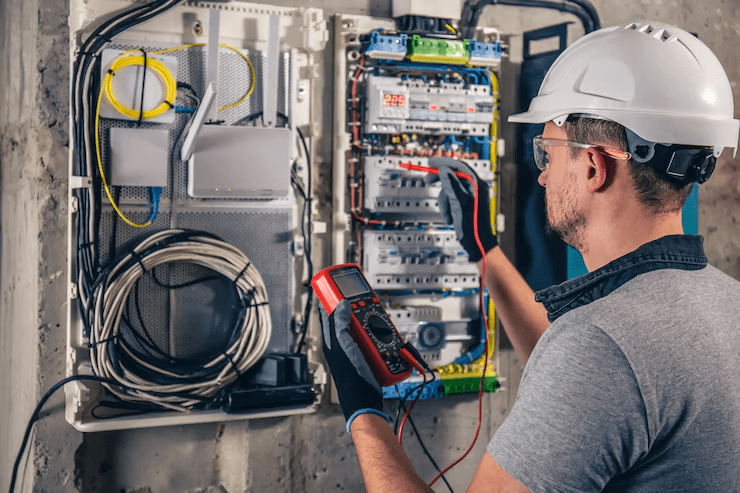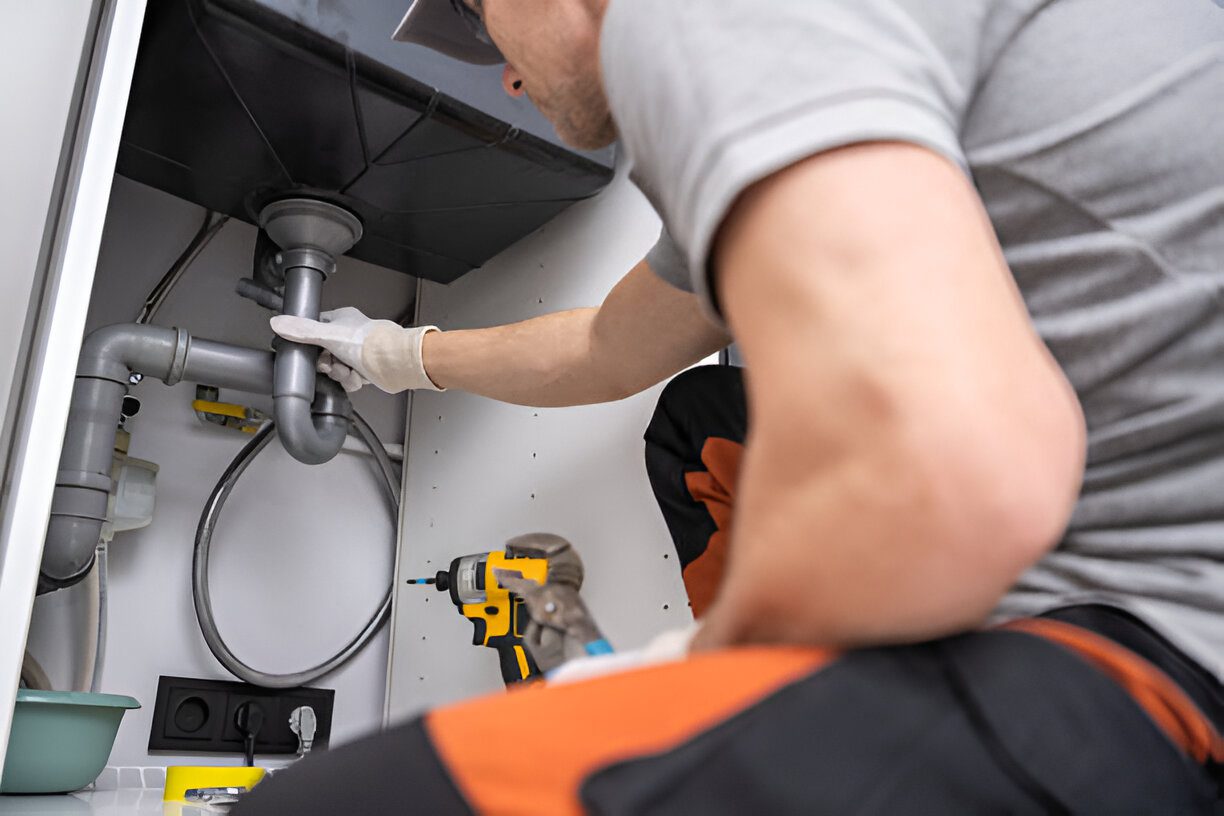Introduction
When managing a commercial property or industrial facility, electrical systems form the backbone of daily operations. From lighting and HVAC systems to machinery and data centers, reliable electrical infrastructure is essential. This is why hiring a commercial electric contractor is not just a routine task — it’s a strategic decision that impacts safety, compliance, operational efficiency, and budget.
Facility managers, property owners, and B2B clients in Milwaukee face unique challenges due to the complexity of industrial electrical needs and local regulatory requirements. This comprehensive guide will walk you through what to look for when selecting a commercial electric contractor. We’ll cover critical areas such as industrial electrician expertise, permit compliance, detailed cost estimation, and how to evaluate prospective contractors effectively.
Why Choosing the Right Commercial Electric Contractor Matters
Electrical failures in commercial buildings can have serious consequences — from downtime that halts business operations to electrical fires or costly violations. Moreover, commercial and industrial facilities often operate under strict safety and compliance regulations. A skilled commercial electric contractor will not only provide quality workmanship but also ensure that your facility adheres to all legal and safety standards.
Hiring an inexperienced or unlicensed contractor can lead to:
- Poor electrical system design causing inefficiencies and higher energy costs
- Non-compliance with electrical codes leading to fines or mandatory rework
- Safety hazards risking injury to staff or customers
- Unforeseen cost overruns and project delays
Conversely, a reputable commercial electric contractor with industrial experience can offer peace of mind, improved system reliability, and cost-effective solutions tailored to your facility’s unique needs.
Key Qualities to Look for in a Commercial Electric Contractor
1. Licensing and Certification
One of the first and most important checks is verifying the contractor’s licensing. In Milwaukee and throughout Wisconsin, electrical contractors must hold a valid state license that proves they meet the required training and competency standards. Additionally:
- Specialized Certifications: Contractors specializing in industrial projects often carry additional certifications for handling complex machinery, high-voltage systems, or automation controls.
- Professional Associations: Membership in organizations like the National Electrical Contractors Association (NECA) signals commitment to industry best practices and ongoing education.
Don’t hesitate to request a copy of their license and certifications and cross-verify with state authorities.
2. Experience with Industrial Electrical Systems
Commercial electric work spans a broad spectrum — from office wiring to retail lighting. Industrial settings, however, require specialized expertise due to:
- Heavy electrical loads powering manufacturing equipment
- Complex control panels and automation systems
- High safety standards and regulatory scrutiny
When evaluating contractors, ask for examples of completed industrial projects similar in scale and complexity to yours. Request case studies or references that demonstrate their ability to handle machinery wiring, programmable logic controllers (PLCs), motor controls, and emergency power systems.
3. Commitment to Permit Compliance
Electrical permits are legally required for most commercial projects. They ensure work is inspected and meets the National Electrical Code (NEC) as well as local amendments in Milwaukee.
A trustworthy contractor will:
- Handle all permit applications on your behalf
- Schedule and coordinate inspections with city officials
- Maintain compliance documentation for your records
Skipping permit compliance risks legal penalties, failed inspections, and voided insurance coverage.
4. Transparent and Detailed Cost Estimation
Budgeting is a top priority for facility managers. A reliable contractor provides a detailed, itemized estimate covering:
- Materials, including wires, panels, conduits, fixtures
- Labor hours and rates
- Permit and inspection fees
- Contingency funds for unforeseen complications
Beware of low-ball estimates that omit important costs; these often result in expensive change orders later.
5. Strong References and Positive Reviews
Past client feedback is invaluable. Contact references, ideally other B2B clients or facility managers, and ask about:
- Timeliness and adherence to schedules
- Quality of workmanship
- Communication and problem-solving skills
- Responsiveness during and after project completion
Online review platforms can also provide insights into the contractor’s reputation in the Milwaukee commercial electrical market.
How to Evaluate a Commercial Electric Contractor in Milwaukee
Step 1: Initial Consultation
Begin with a face-to-face or virtual meeting to discuss:
- Your facility’s specific electrical needs and challenges
- Contractor’s experience and technical capabilities
- Approach to safety, compliance, and project management
- Preliminary timelines and budget expectations
Good contractors will listen carefully and provide thoughtful initial feedback.
Step 2: Review Proposals and Quotes
When proposals arrive, look for clarity and thoroughness. The best quotes will:
- Break down each component of the project
- Explain assumptions or exclusions
- Include payment terms and warranty details
Comparing multiple proposals helps ensure you select a contractor who offers value without sacrificing quality.
Step 3: Verify Credentials and Insurance
Confirm that the contractor carries:
- General Liability Insurance: Protects your business in case of accidental damage
- Workers’ Compensation Insurance: Covers injuries to their employees on your site
- Performance Bonds: Guarantees project completion in case the contractor defaults
Insurance coverage protects you from liability and financial loss.
Step 4: Site Visit and Assessment
A professional contractor will visit your site to:
- Assess the existing electrical system and infrastructure
- Identify any potential hazards or logistical challenges
- Advise on necessary upgrades or code compliance issues
- Tailor their proposal based on firsthand observations
This step ensures the estimate and project plan reflect real conditions.
Common Commercial Electrical Services Offered
A full-service commercial electrical contractor should be able to provide:
- New Construction Wiring: Design and installation of electrical systems for new buildings
- Electrical Upgrades and Retrofits: Modernizing outdated panels, wiring, or lighting
- Preventive Maintenance: Routine inspections to detect issues before they cause downtime
- Troubleshooting and Repairs: Diagnosing and fixing electrical failures or hazards quickly
- Emergency Electrical Services: 24/7 support for unexpected electrical problems
- Energy Efficiency Solutions: LED lighting retrofits, smart controls, and energy audits to reduce operational costs
The Role of the Industrial Electrician in Commercial Projects
Industrial electricians are specialists trained to work on:
- High-voltage distribution systems
- Heavy machinery wiring and motors
- Control panels and programmable logic controllers (PLCs)
- Safety systems and emergency power solutions
Hiring a contractor with experienced industrial electricians ensures your facility meets productivity goals while maintaining safety compliance.
Milwaukee Permit Compliance for Commercial Electrical Work
The City of Milwaukee’s Inspection Services oversees electrical permitting and inspections. Some important points include:
- Permit Application: Contractors must apply for permits prior to starting any significant electrical work.
- Inspections: Multiple inspections may be required at different project phases (rough wiring, final installation).
- National Electrical Code (NEC): Milwaukee enforces the NEC with city-specific amendments.
- Penalties: Failure to obtain permits or pass inspections can result in fines and project delays.
Your contractor should act as a liaison to ensure smooth compliance with all municipal regulations.
Cost Estimation Tips for Commercial Electrical Projects
Understanding how estimates are developed helps you make better decisions:
- Scope Definition: Ensure the project scope is fully understood and documented. Unclear scope leads to unexpected costs.
- Material Quality: Cheaper materials might save money upfront but increase maintenance costs. Request specifications.
- Labor Expertise: Highly skilled electricians cost more but reduce errors and rework.
- Contingency Planning: Set aside 10-15% of the budget for unforeseen issues.
- Payment Terms: Negotiate milestone-based payments tied to project progress.
Request detailed written estimates and don’t hesitate to ask for clarification on any item.
Additional Tips for Facility Managers
- Plan Ahead: Engage electrical contractors early in your project planning to avoid last-minute surprises.
- Communication: Maintain regular contact throughout the project to monitor progress and address concerns promptly.
- Documentation: Keep all permits, contracts, inspection reports, and warranties organized for future reference.
- Safety First: Verify that the contractor follows OSHA regulations and enforces job site safety protocols.
Frequently Asked Questions (FAQs)
1. How do I verify a commercial electric contractor’s license in Milwaukee?
Licenses can be verified through the Wisconsin Department of Safety and Professional Services. Contractors should also provide a current license upon request.
2. What is the difference between a commercial electrician and an industrial electrician?
While commercial electricians typically work on office buildings, retail stores, and general commercial spaces, industrial electricians specialize in factories and plants, handling complex machinery, motor controls, and high-voltage systems.
3. Why is permit compliance important for commercial electrical work?
Permit compliance ensures electrical installations meet safety codes and legal requirements, protecting your facility from hazards, fines, and insurance issues.
4. How detailed should a cost estimate be?
A comprehensive cost estimate should itemize materials, labor, permits, and contingency allowances, giving you a clear picture of all project expenses.
5. Can a commercial electric contractor help with energy-efficient upgrades?
Yes. Many contractors offer services like LED lighting retrofits, smart controls, and energy audits designed to reduce operating costs and increase sustainability.
Conclusion
Selecting the right commercial electric contractor is a strategic decision that directly impacts your facility’s safety, efficiency, and compliance. For Milwaukee-based businesses, prioritize contractors with valid licenses, strong industrial experience, thorough permit compliance, and transparent cost estimates. Following these guidelines will help you partner with professionals who understand the complexities of commercial electrical projects and deliver reliable, high-quality results.
Internal Links
- Industrial Electrician Services in Milwaukee
- Electrical Permit Compliance Guide
- Energy Efficiency Solutions for Commercial Buildings
External Links
- Wisconsin Department of Safety and Professional Services
- National Electrical Contractors Association (NECA)
- City of Milwaukee Inspection Services
- Occupational Safety and Health Administration (OSHA)


